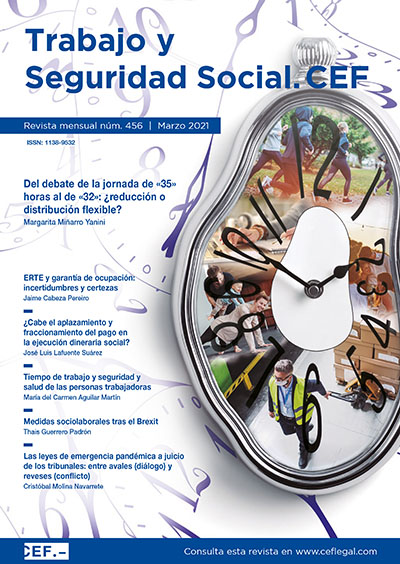Modern scenarios for working (and life) times: (social and judicial) actuality of a classic in search of its (impossible?) «sovereignty»
DOI:
https://doi.org/10.51302/rtss.2021.2342Keywords:
working time, break time, Matzak doctrine, Tyco doctrine, right to digital disconnectionAbstract
The reduction of the working day to 4 days a week (32 hours) is debated in several countries. For its part, the ILO calls for greater individual self-determination (sovereignty) of life times, also within work. However, in the day-to-day life of most people’s workplaces, the most relevant issue seems to be the opposite: the extension of the availability times for the interest of the company beyond the normal working day and the problems to disconnect. Localized guards, training times –often digital and off-hours–, times for socializing with clients, etc., extend working time and reduce time for breaks. Even collective bargaining, when it regulates the right to digital disconnection introduces new obligations for digital reconnection outside the normal working day.
Likewise, working people need greater flexibility to organize their work times, adapting them to their needs to reconcile work and family life. Therefore, the flexible distribution of the working day seems to be the prevalent debate in our time, both for productive reasons and for worker reasons. So much social and legal complexity in ordering working and life times significantly increases judicial conflict. This study makes a detailed analysis of the state of the judicial and jurisprudential art in terms of effective working times, availability times and rest times.
Downloads
References
Byung-Chul, Han. (2017). La sociedad del cansancio (2.ª ed.). Herder.
Confederación Europea de Sindicatos. (20 de enero de 2021). Derecho a desconectar. Carta conjunta de ETUC/ETUF a los diputados al Parlamento Europeo. https://www.etuc.org/en/document/right-disconnect-joint-etucetufs-letter-members-european-parliament
Olías, Laura. (6 de octubre de 2020). La Inspección de Trabajo insta a Prosegur a que deje de llamar y mandar correos a sus empleados fuera del horario laboral. elDiario.es. https://www.eldiario.es/economia/inspeccion-trabajo-insta-prosegur-deje-llamar-mandar-correos-empleados-fuera-horario-laboral_1_6272926.html
Parlamento Europeo. (21 de enero de 2021). El «derecho a la desconexión» debería ser un derecho fundamental en la UE. https://www.europarl.europa.eu/news/es/press-room/20210114IPR95618/el-derecho-a-la-desconexion-deberia-ser-un-derecho-fundamental-en-la-ue
Rodríguez Contreras, Ricardo y Vargas Llave, Óscar. (10 de noviembre de 2020). El derecho a la desconexión en el trabajo: breves apuntes de la propuesta debatiéndose actualmente en el Parlamento Europeo. https://www.transformaw.com/blog/el-derecho-a-la-desconexion-en-el-trabajo-breves-apuntes-de-la-propuesta-debatiendose-actualmente-en-el-parlamento-europeo
Rojo Torrecilla, Eduardo. (1 de febrero de 2021). Sobre el derecho a la desconexión digital en el trabajo… y sobre los intentos de devaluar la importancia del diálogo social europeo y su trascendencia jurídica. A propósito de la Resolución del Parlamento Europeo de 21 de enero de 2021 (y unas notas sobre las conclusiones del abogado general del TJUE en el asunto C-928/19). El blog de Eduardo Rojo. http://www.eduardorojotorrecilla.es/search?updated-max=2021-02-02T11:49:00%2B01:00&max-results=5


















